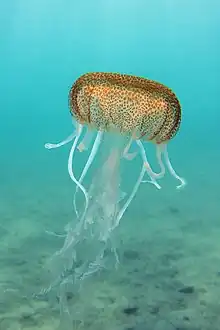| Mawia | |
|---|---|
 | |
| Mawia benovici | |
| Scientific classification | |
| Domain: | Eukaryota |
| Kingdom: | Animalia |
| Phylum: | Cnidaria |
| Class: | Scyphozoa |
| Order: | Semaeostomeae |
| Family: | Pelagiidae |
| Genus: | Mawia Avian, Ramšak, Tirelli, D'Ambra & Malej, 2016 |
| Species: | M. benovici |
| Binomial name | |
| Mawia benovici (Piraino, Aglieri, Scorrano & Boero, 2014) | |
| Synonyms | |
| |
Mawia is a genus of jellyfish in the family Pelagiidae. It is a monotypic genus with the sole species Mawia benovici.[1] The team who discovered this jellyfish named it benovici after a late colleague, Adam Benovic.[2][3] Originally belonging to the genus Pelagia, it was later moved into its own genus, which was named after the Arab warrior-queen Mavia.[4] Although described based on specimens from the Adriatic Sea, a part of the Mediterranean, it was speculated that these might be transplants (via ballast water) rather than a part of its natural range.[2] A later study found specimens in Senegal, indicating that its natural range possibly is the Atlantic Ocean off West Africa.[5]
 This is the first recorded find of M. Benovici in the Croatian part of the Adriatic Sea.
This is the first recorded find of M. Benovici in the Croatian part of the Adriatic Sea. A view from below reveals gonads of yellow color, which means that the jellyfish is male.
A view from below reveals gonads of yellow color, which means that the jellyfish is male. A view of the top of the bell.
A view of the top of the bell. Jellyfish and its reflection on the sea surface.
Jellyfish and its reflection on the sea surface.
References
- ↑ "WoRMS - World Register of Marine Species - Mawia benovici (Piraino, Aglieri, Scorrano & Boero, 2014)". www.marinespecies.org. Retrieved 2018-01-30.
- 1 2 "Pelagia benovici sp. nov. (Cnidaria, Scyphozoa): a new jellyfish in the Mediterranean Sea | PIRAINO | Zootaxa". Biotaxa.org. Retrieved 2014-05-12.
- ↑ Lizzy Davies in Rome (12 May 2014). "New jellyfish species identified in Gulf of Venice | World news". theguardian.com. Retrieved 2014-05-12.
- ↑ Avian, M.; Ramšak, A.; Tirelli, V.; D'ambra, I.; Malej, A. (2016). Redescription of Pelagia benovici into a new jellyfish genus, Mawia, gen. nov., and its phylogenetic position within Pelagiidae (Cnidaria: Scyphozoa: Semaeostomeae). Invertebrate Systematics. 30(6), 523-546. doi:10.1071/IS1601
- ↑ Gaffney, Patrick M.; Collins, Allen G.; Bayha, Keith M. (2017). "Multigene phylogeny of the scyphozoan jellyfish family Pelagiidae reveals that the common U.S. Atlantic sea nettle comprises two distinct species (Chrysaora quinquecirrha and C. chesapeakei)". PeerJ. 5: e3863. doi:10.7717/peerj.3863. ISSN 2167-8359. PMC 5642265. PMID 29043109.
This article is issued from Wikipedia. The text is licensed under Creative Commons - Attribution - Sharealike. Additional terms may apply for the media files.